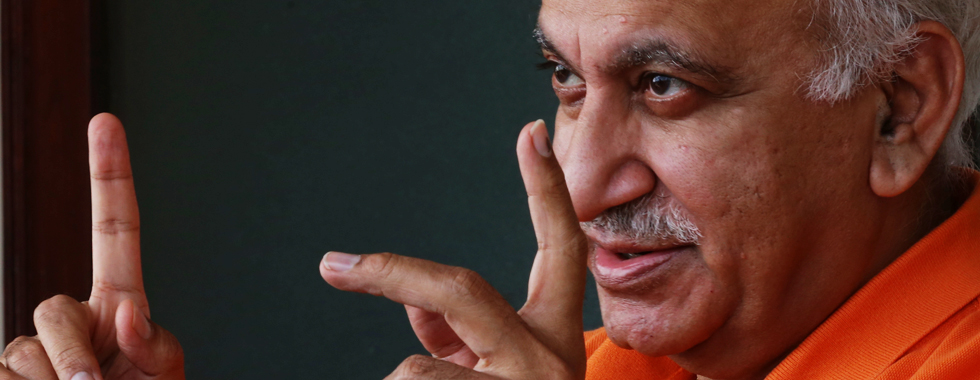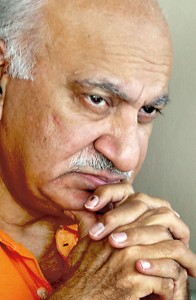Sunday Times 2
BJP spokesman: No interference in internal affairs of Sri Lanka
India’s new Narendra Modi government is seeking a new relationship with Sri Lanka – a relationship based on the principle of non-interference in internal affairs, a ruling party spokesman said in Colombo.
The ruling Bharatiya Janata Party National Spokesman M.J. Akbar who visited Sri Lanka on a lecture tour told the Sunday Times that Sri Lanka’s national question and allegations of China getting too much of a foothold here were essentially issues for Sri Lanka to handle. Asked about the security concerns being raised in India over China’s involvement in Sri Lanka, Mr. Akbar, author of several non-fictions such as Nehru: The Making of India, The Shade of Sword: A Cohesive History of Jihad, and Kashmir: Behind the Vale, said India would address these issues by talking to a friendly Sri Lanka the way it would talk to friends.
While giving a positive and optimistic picture of Indo-Sri Lanka relationship, the BJP Spokesman took a tough stand on Pakistan, accusing it of creating terror groups. Excerpts:
-Sri Lanka’s ethnic problem is essentially an internal matter for Sri Lanka to resolve. However, over the years, this has become India’s problem also. How can India extricate itself from this problem and let Sri Lanka deal with it the way it thinks is the best?
You are right. It is Sri Lanka’s problem. I don’t think India needs to get involved or extricate itself from this. India has purely humanitarian concerns. We have been clear that we have no support for secessionism. For God’s sake, this is not the colonial age where secessionism was used as a policy to divide people. We have absolutely no interest to support secessionism. But our humanitarian concern is that we expect all Sri Lankan citizens to be treated as equal citizens.
- The relations between the two countries in recent years have been bogged down by issues such as Indian fishermen poaching in Sri Lankan waters and China’s involvement in Sri Lanka’s infrastructure development projects, some of which have raised eyebrows in India because of their strategic nature. For instance, the Chinese are involved in building Sri Lanka’s ports, airports, and aircraft repair facilities. Your comments:

We are not willing to deal with any nation which provides sanctuary for terrorists or which supports terror. Pix by M.A. Pushpakumara
Please understand that bilateral relations are not zero sum games. Sri Lanka is an independent country it has the right to take decisions that it deems best about its development and economics. No country has economic relations with only one other country. Everyone has multilateral relations and India welcomes investments from Japan as much as from China and the US.
When they come with some problems, we can solve them in the spirit of good neighbourly relations. India and Sri Lanka are good neighbours. No doubt about it and all the scepticism in the world will not change it. This skepticism is generated in public discourse sometimes to create a problem and find something to write about. Yes where there are legitimate security concerns — yes India has occasional legitimate security concerns — we will address them and we will talk to friends the way we talk to friends.
- Your defence secretary was in Sri Lanka recently and this was followed by our defence secretary visiting New Delhi. Were these legitimate concerns raised at these meetings?
A: Do you know how deep the defence relationship between India and Sri Lanka is? Why don’t we look at the positive side of it? Look at the number of Sri Lankan military officers being trained in India. So when defence chiefs meet, they discuss measures to accentuate and increase positions.
- The Tamil Nadu factor has been seen as a key determinant in India’s Sri Lanka policy. How would the Narendra Modi government deal with this factor?
A: All ethnic overlaps create some emotional resonance. Both India and Sri Lanka are mature enough to handle this factor. Unfortunately the previous prime minister did not attend the Commonwealth Summit held in Sri Lanka. You can see a difference in our government’s policy. Prime Minister Modi made it clear that the President of Sri Lanka was a welcome guest at his inauguration.
- The previous Indian government had for two consecutive years supported a US-backed resolution on Sri Lanka’s alleged war crimes when it was tabled at the United Nations Human Rights Council. But in March this year, it abstained when the vote was taken on the anti-Sri Lanka resolution. What will be the position of the Modi government with regard to this issue?
A: I am sure, when the time comes, you will see very mature behaviour on the part of Delhi.
- How would the Modi government find a solution to the issue of Indian fishermen poaching in Sri Lankan waters and respond to the charge of Sri Lankan fishermen that Indian fishermen are illegally taking away what ought to be their catch?
A: These problems are inevitable when relationship between two countries involve an overlapping sea. This involves their livelihood. Basically they are not rich people and they are living a tough life. But I think in the spirit of amicable harmony these issues could be resolved, given good will on both sides.
- Recently, some terror groups warned that they would hit hard at India. How would the Modi government respond to these threats?
A: Our Prime Minister has made one thing clear: The central objective of his government is essentially to tackle poverty. We have to eliminate poverty. Today, India and South Asia are synonymous with poverty. We have to convert poverty into prosperity. We cannot achieve economic prosperity without peace. Peace means peace within the country and also more importantly peace with our neighbours. Not just peace, we also seek active friendship, cooperation, economic development, trust and moves to eliminate the trust deficit. We want to take this relationship to a new magnetic step forward.
But one thing is non-negotiable. We are not willing to deal with any nation which provides sanctuary for terrorists or which supports terror. We will not have anything to do with factories of terror. And we know this battle is also an ideological battle. A battle between nations which believe that all religions are equal, in pluralism, secularism, that all are equal before the law, in freedom of faith and nations which believe that within their geographical confines only one faith can exist.
So we understand that those who overtly and covertly provide safe havens for terrorists are basically nations that breed chaos rather than peace and stability. We have nothing to do with such nations.
We know that there is a serious threat from them. The recent joint statement between Prime Minister Modi and US President Barack Obama had an important paragraph where the US has accepted that India has a legitimate role in the war or terrorism – both on Pakistan’s soil and in Afghanistan. It mentions the Haqqani terror network and mentions cooperation on that. So the world is listening to what India has been saying. The world is no longer ready to accept Pakistan’s failing alibis and excuses.
- But Pakistan itself is fighting these terror groups?
A: This is wrong. It is Pakistani propaganda. These groups have been created by Pakistan and the ISI. Sometimes, there is blowback because these venomous groups bite the hand that feeds. It is important to recognise that the export of Jihad is not acceptable. I am hesitant to use the word Jihad, because it is a misuse of the Islamic doctrine. Unfortunately the word is commonly used. And the misuse of Jihad is going to hurt Pakistan. I say it with some sadness that long before these terrorist groups hurt anyone else, they will hurt the Muslims.
- You mentioned secularism in your answer. But Hindutva groups such as RSS and Shiv Sena are part of the Modi government. So how committed is the Modi government to secularism?
This is a government that works along with RSS. But the statements made by the Prime Minister who is the voice of the government cannot but have the approval of the RSS. The Prime Minister has made this clear more than one hundred times. He said that in public life, the temple is parliament and the book of parliament is the constitution. In the country’s constitution you can read it. We are committed to the constitution. In terms of political application, he has said hundred times that he wants development for all, including Muslims, Christians and Sikhs. He said specifically “I dream of the Muslims in I carrying the Quran in one hand and a computer in the other. That is the kind of Muslim I want.” He said you can’t deny him the opportunity to get jobs. You must make him skilled. You must make him capable of becoming part of the rising Indian economy. So there is total clarity on this issue.
- But there is no Muslim MP in the lower house of parliament?
A: But there is one Minister in the government. In the next shuffle there will be another minister.
- Tensions were high in recent months in Kashmir with troops from both sides firing at each other and in the process killing or wounding scores of civilians. How does the Modi government propose to solve the Kashmir issue with Pakistan?
A: We don’t confuse the Kashmir issue with Pakistan. Kashmir is an internal problem of India. Pakistan’s claims are no longer tenable. Each time Pakistan raises the issue at international fora, the world yawns and tells Pakistan to come back with something else to discuss. At the last United Nations General Assembly sessions, when Pakistan’s Prime Minister Nawaz Sharif tried the same old antics, there weren’t event half a dozen people in the hall or may be a dozen. But when our Prime Minister spoke, it was overcrowded. Pakistanis should get it that the world is not interested in knowing reasons for violence, conflict and strife. The world is moving on. The 21st century belongs to people who want to create an economy – not people who want to inflict wars.
- What is India’s stance towards the new economic order that is taking shape with BRICS forming a new bank and China giving leadership to the Asian Infrastructure and Investment Bank?
A: As our Prime Minister said India’s presence is noticeable by its absence in world affairs. The world is beginning to see the role that India can play in cooperation with China and in cooperation with BRICS countries. Our profile has suddenly risen as a powerful nation that can contribute to the good of the world.
- With India now identifying itself more with BRICS, will there be any decline of its SAARC role?
A: The purpose of SAARC is to increase cooperation with neighbours. The Modi government has multiplied cooperation with neighbours when compared with the last ten years. Let me tell you a fact that may startle you. In 17 years, an Indian Premier had not gone to Nepal on a bilateral visit. Sometimes even I can’t believe it. Modi went there in August. Maoist leader Prachanda, who was considered to be the most hostile towards India, was in tears after he listened to our prime minister’s speech. Prachanda said his old opinion of India no longer holds. This was because Prachanda, who also wants the good of Nepal, saw suddenly an Indian leader coming to them and saying they are ready to cooperate and become a partner in progress. In the past so many years, Indian governments had vested interest in problems – not in solutions because there was some politics to be played out of problems.

